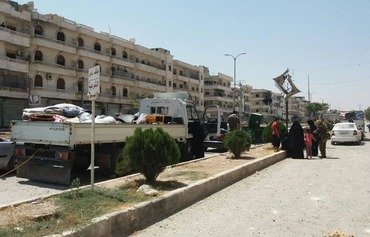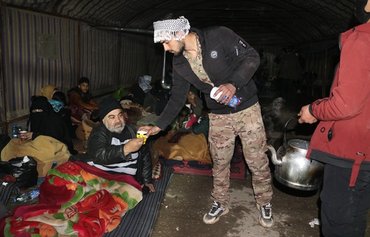Life in the Syrian city of Manbij has been steadily improving, residents tell Diyaruna, since liberating forces brought two years of "Islamic State of Iraq and the Levant" (ISIL) rule to an end on August 12th.
Though residents of the Aleppo province city still face difficult conditions due to the overall deterioration of the economy, local and international organisations have been able to resume the delivery of humanitarian aid.
Shortly after the city's liberation, the international coalition began to deliver food aid to the city through the Manbij Organisation for Relief and Development, organisation member Munther Badr told Diyaruna.
Aid is distributed to residents based on lists that are consistently updated and subjected to close scrutiny, he said.
![Women and children in the Syrian city of Manbij receive aid from humanitarian organisations after the 'Islamic State of Iraq and the Levant' was driven from the area. [Photo courtesy of the Syrian Democratic Forces]](/cnmi_di/images/2016/10/07/6307-Syria-manbij-aid-600_384.jpg)
Women and children in the Syrian city of Manbij receive aid from humanitarian organisations after the 'Islamic State of Iraq and the Levant' was driven from the area. [Photo courtesy of the Syrian Democratic Forces]
"The number of rations distributed as of the end of September totaled about 14,000 food baskets, including 5,000 that were distributed upon the liberation of the city and contained various food items, including grain, rice, cooking oil, soap, clothes and water," Badr said.
The largest batch of aid was distributed ahead of Eid al-Adha, which began on September 11th, he said, in order to "impart a sense of comfort to residents as much as possible".
Aid flows into the city
"The distribution of aid in Manbij city began upon its liberation following the success of the campaign named after the martyr leader Faisal Abu Layla that liberated the city and its rural areas," Manbij Civil Council co-chairman Farouk Diab al-Mashi told Diyaruna.
Relief organisations launched a number of initiatives to distribute food to residents who had suffered under ISIL siege, he said.
After the Manbij Civil Council assumed the responsibility of administering the city, relief operations flowed through it to reach all residents, al-Mashi said.
The council funnels some of the aid, while the rest is distributed by relief organisations licensed by the autonomous administration of the Kobani canton, which receives the aid and distributes it to the regions according to their needs.
"The food baskets distributed by the council weigh up to 55 kilogrammes," he said, adding that each basket can feed a family for about two months.
Relief work in Manbij also includes the provision of medical supplies, equipping the city’s clinic, repairing and reopening the city’s schools and regulating transportation routes to and from the city, al-Mashi said.
Work is under way to clear the rubble of homes destroyed in the battle with ISIL, he said, and there also are attempts to restore services.
These include the city’s police force, he said, which has begun functioning to "ensure the comfort and security of residents returning to the city".
Conditions remain difficult
Conditions in the city remain "dire" for some residents, Manbij shopkeeper Ayham Issa, 35, told Diyaruna.
Some residents fled when ISIL overran the city, leaving everything behind, and lost it all as it was looted by the group's fighters, he said, while others remained, with no possibility of work.
"Although some items can be found in the markets and activity is gradually picking up, the residents’ purchasing power is very weak," he said.
Most agricultural areas are still not safe, Issa added, amid ongoing sniping and shelling or due to mines planted by ISIL when it was still present in the city to prevent residents from escaping to areas outside its control.
Work is under way to clear the agricultural areas of mines in co-operation with the Manbij Military Council and various international organisations, he said.
"Things seem to be gradually returning to normal in the city," he added.
The Manbij Civil Council is overseeing the election of neighbourhood committees that will work to determine the needs of residents in the city and its surrounding areas, Issa said.

![Men representing their households form an orderly line to receive their ration of humanitarian aid from the back of a Manbij Military Council distribution vehicle. [Diyaruna]](/cnmi_di/images/2016/10/07/6316-aiddelivery-600_384.jpg)
![The interior of the primary warehouse in Manbij at the completion of the first tranche delivery. [Diyaruna]](/cnmi_di/images/2016/10/07/6317-manbijaid1-600_384.jpg)
![The interior of the above warehouse at the completion of the second tranche delivery. [Diyaruna]](/cnmi_di/images/2016/10/07/6318-manbijaid2-600_384.jpg)





